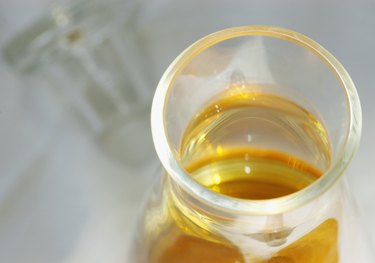
Siberian pine nut oil supplements are sold as cholesterol-lowering agents, appetite suppressants, immune-boosters and for their possible benefits in lowering blood pressure. While preliminary research looks promising for such benefits, more study is needed to confirm or refute pine nut oil's potential, say "Tree Nuts" authors Cesarettin Alasalvar and Fereidoon Shahidi. More study on the oil's side effects is needed as well, though some potential effects are known.
Allergic Reaction
Video of the Day
You risk an allergic reaction when you take Siberian pine nut oil – especially if you have a peanut allergy or are allergic to other tree nuts such as cashews, hazelnuts, walnuts, pecans, macadamias or pistachios, warn Joyce I. Boye and Samuel Benrejeb Godefroy, authors of "Allergen Management in the Food Industry." Your body releases histamine when you have a reaction, which can cause allergy symptoms including swelling, wheezing, a stomach ache, itchy hives and vomiting. An allergic reaction also can trigger the sudden and potentially life-threatening condition called anaphylaxis. This condition causes your airways to swell and your blood pressure to drop.
Video of the Day
Seizures
One of the major unsaturated fatty acids in pine nut oil is linoleic acid, which is an omega-6 fatty acid. You need to avoid taking supplements with high omega-6 content if you have a seizure disorder. That's because some reports associate such supplements with seizures, according to University of Maryland Medical Center.
Bleeding
You need to use caution and consult a health care provider when taking supplements rich in omega-6 fatty acids such as linoleic acid if you take blood thinning medications because they can increase your risk for bleeding or bruising, according to UMMC. Such medicines include aspirin, warfarin, and clopidogrel.
Expert Insight
Since the possible side effects and toxicity of Siberian pine nut oil are not well studied, including its interactions with medicines, you need to approach this supplement with caution and take it under the supervision of a health care provider, advise the experts at UMMC. Be especially careful if you are pregnant because safety of supplemental omega-6 fatty acids had not been established for pregnant or breast-feeding women as of 2010, according to Oregon State University. One study, conducted on rats, found no detrimental effect on fetuses, but more research is needed to confirm such results, note Alasalvar and Shahidi.
- Oregon State University: Essential Fatty Acids
- Science Direct: “Food Chemistry”; Chemical composition and nutritive value of Pinus pinea L. seeds; Cevdet Nergiz and Clal Dönmez; 2004
- University of Maryland Medical Center: Omega-6 Fatty Acids
- “Allergen Management in the Food Industry”; Joyce I. Boye and Samuel Benrejeb Godefroy; 2010
- KidsHealth.org: Nut and Peanut Allergy
- “Tree Nuts”; Cesarettin Alasalvar and Fereidoon Shahidi; 2008